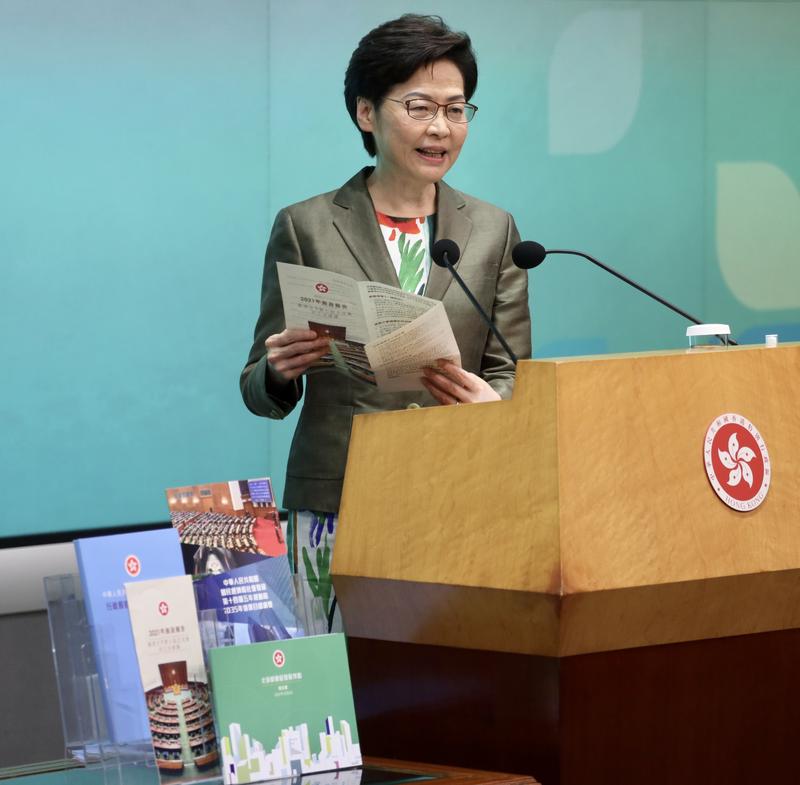 Hong Kong Chief Executive Carrie Lam Cheng Yuet-ngor hosts a press conference after delivering her fifth Policy Address, Hong Kong, Oct 6, 2021 (EDMOND TANG / CHINA DAILY)
Hong Kong Chief Executive Carrie Lam Cheng Yuet-ngor hosts a press conference after delivering her fifth Policy Address, Hong Kong, Oct 6, 2021 (EDMOND TANG / CHINA DAILY)
HONG KONG – Chief Executive Carrie Lam Cheng Yuet-ngor said on Wednesday that Hong Kong intends to boost its competitiveness not just as a global finance and trade hub but also as an international center for innovation and technology, leveraging support from the central government.
Lam said in her fifth Policy Address that the Hong Kong Special Administrative Region government has invested more than HK$130 billion ($16.69 billion) in I&T development over the past four years.
Chief Executive Carrie Lam proposed expanding the capacity at the Hong Kong Science Park, which is home to about 900 technology enterprises and start-ups. The expansion will involve providing an additional 88 hectares of land, largely for I&T development
These investments included setting up two InnoHK research clusters by the Hong Kong Science and Technology Parks Corporation (HKSTPC) that have led world-class universities and research institutes to collaborate with local universities.
"I now propose the setting up of an InnoLife Healthtech Hub in the Hong Kong-Shenzhen Innovation and Technology Park in the Loop," Lam said.
She said the HSITP and areas around Lok Ma Chau/San Tin will become the San Tin Technopole which, together with the Shenzhen I&T zone, will form the Shenzhen-Hong Kong I&T Co-operation Zone.
ALSO READ: CE unveils major housing plan in 5th Policy Address
The resulting 540-hectare site will combine the strengths of Hong Kong and Shenzhen, powering the development of an international I&T hub in the Guangdong-Hong Kong-Macao Greater Bay Area, Lam said.
Lam proposed expanding the capacity at the Hong Kong Science Park, which is home to about 900 technology enterprises and start-ups. The expansion will involve providing an additional 88 hectares of land, largely for I&T development.
She also said that government was considering the construction of a new Science Park/Pak Shek Kok Station on the East Rail Line at the current site of the Hong Kong Education University Sports Centre in Pak Shek Kok. The Sports Centre would be relocated close to the University's main campus.
The Advanced Manufacturing Centre at the Tseung Kwan O Industrial Estate and the Microelectronics Centre at the Yuen Long Industrial Estate will be completed in 2022 and 2023, respectively, Lam said.
"The good industry response to these two facilities indicates that many enterprises share the view that high value-added and technology-intensive manufacturing processes and production lines can be set up in Hong Kong," she said.
ALSO READ: CE outlines visionary Northern Metropolis plan
"In view of this, I have invited the HKSTPC to start planning for the construction of the second Advanced Manufacturing Centre."
Lam said the government has accepted, in principle, proposals to provide land for research use to the University of Hong Kong and the Chinese University of Hong Kong.
That includes a 4-hectare site at Pok Fu Lam to construct HKU facilities for deep technology research, and 2.5 hectares near the CUHK Medical Centre to build research facilities and expand the Medical Centre. Lam said she also supported the Hong Kong Polytechnic University's interest in using the Hung Hom Bay Campus for academic and research development.
Lam noted that HKSAR universities have established close collaborative relationships with mainland research institutions over the years.
"For instance, we are all proud of the fact that some of the instruments currently used on the Moon and Mars were developed by PolyU, which has actively participated in our nation's space exploration projects," she said.
READ MORE: HK set to grasp new opportunities
Under the nation’s 14th Five-Year Plan, the central government backs Hong Kong’s efforts to enhance its status as a global I&T, finance, transportation, trade and aviation hub.
It also supports developing the city into an international legal and dispute resolution services center in the Asia-Pacific region, an East-meets-West center for international cultural exchange, and a regional intellectual property trading hub.
Since the implementation of the National Security Law and the reforms to the electoral system, safety and stability have returned to Hong Kong, Lam said.
"Hong Kong is now ready again for a new start for economic development," she added.


